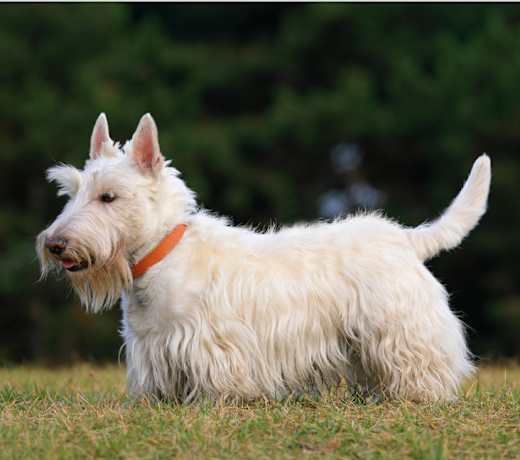Wire Fox Terriers are a medium-sized breed. Adult males stand about 15 inches tall at the shoulder and weigh around 28 pounds. Females are slightly smaller. Despite their compact size, they have an energetic and outgoing nature.
Wire Fox Terrier
Breed Type: Terrier
Common nicknames: Foxie, Wirehaired Terrier, WFT, WHFT
Coat: Wiry, double
Hypoallergenic: Yes, they may not trigger allergies.
Temperament: Alert, energetic, outgoing, playful
Life expectancy: 12-15 years
Color & patterns: Tri-color

The Wire Fox Terrier is a spunky canine companion with a distinctive scruffy appearance who will keep you on your toes with their boundless energy and endless charm. These charismatic and lively pups have playful personalities, but they’re also very intelligent; they have a knack for problem-solving and are always up for a mental challenge. Their wiry coats protected them from harsh terrain and weather conditions, allowing them to excel in the field.
Wire Fox Terrier characteristics
Learn about about Wire Fox Terrier basics like their fur colors, shedding levels, how much grooming they need, and other Wire Fox Terrier facts.
Average height
15-16 inches (38.1-40.6cm)
Average weight
12-28 pounds (5.4-12.7 kg)
Average lifespan
12-15 years
Exercise needs
Grooming needs
Full-grown size
Good with cats
Good with kids
Training aptitude
Do Wire Fox Terriers shed?
Yes, Wire Fox Terriers shed, but they are a low-shedding breed. Their dense, wiry coat does not shed much, but it does require regular grooming to prevent matting and to maintain its texture. Brushing and periodic hand-stripping, which involves plucking the dead hairs by hand or with a stripping knife, help keep their coat in good condition and reduce shedding. Note that hand stripping should not be painful or uncomfortable for your dog as it involves only removing dead, loose hair.
What color are Wire Fox Terriers?
Wire Fox Terriers have a white coat with black and tan markings. The white coloring is often predominant, while the black and tan patches are distributed on the body and sometimes on the head and ears. This color pattern is a characteristic feature of the breed, adding to their distinctive and lively appearance.
What age does a Wire Fox Terrier stop growing?
Wire Fox Terriers typically stop growing in height and length by the time they are about 12 to 18 months old. After they reach this milestone, Wire Fox Terriers will continue to fill out and gain muscle mass until they are around two years old. The size, height, and weight of individual dogs may vary. Proper nutrition, exercise, and consistent vet care can support healthy growth and development.
How long do Wire Fox Terriers live?
Wire Fox Terriers can live an average of 12 to 15 years. Various factors, including genetics, diet, and overall health care, can influence their longevity. Providing veterinary checkups, a balanced diet, enrichment, exercise, dental care, grooming, socialization, and rewards/relationship-based training can contribute to a long, healthy, and happy life.
Are Wire Fox Terriers rare?
Yes, Wire Fox Terriers are becoming a rare breed because of a significant decline in their population over the last few years. According to the U.K.’s Kennel Club, the breed has declined by nearly 30 percent in the last five years. Since their height of popularity in 1947, the litter rates have decreased 94 percent.
Wire Fox Terrier history
Learn about where the Wire Fox Terrier came from.
What were Wire Fox Terriers bred for?
Wire Fox Terriers were originally bred as hunting dogs. Specifically, these bold and energetic dogs assisted hunters by chasing small game, such as foxes, from their dens. Their build allowed them to drive out animals from underground dens and other tight spots. Their dense, wiry coat helped shield them from brambles, thorns, and other obstacles they encountered while hunting.
Where are Wire Fox Terriers from?
Wire Fox Terriers are from England. Their Fox Terrier ancestry dates back to the 1700s, but this breed was officially recognized by the American Kennel Club (AKC) in 1885 and is a descendant of the Rough-coated Black and Tan Terrier and the Smooth Fox Terrier.
Wire Fox Terrier temperament
Learn about about the Wire Fox Terrier temperament and how well they fit into your lifestyle, home environment, and family.
Do Wire Fox Terriers bark a lot?
Yes, Wire Fox Terriers bark a lot. They are an alert and energetic breed, often barking to express excitement, alert their pet parents to perceived threats, or out of boredom. Proper training and socialization can help manage their barking tendencies, but potential pet parents should be prepared for a dog who may be more vocal than some other breeds.
Are Wire Fox Terriers good family dogs?
Yes, Wire Fox Terriers are good family dogs with their spunky, outgoing, and energetic personalities. One of their favorite activities is digging, and they do best if they have some outdoor space to exercise, dig, and play in. Wire Fox Terriers are best suited for families who can meet their high energy and exercise needs. With consistent socialization, enrichment, and exercise, they can be loyal and entertaining companions for active families.
Are Wire Fox Terriers good with cats?
No, Wire Fox Terriers don’t tend to be good with cats because they can have a strong prey drive, which makes them less compatible with smaller animals; their instinct to chase them may lead to tension or conflict.
Individual temperaments vary, and some Wire Fox Terriers can learn to live peacefully with cats if introduced properly and socialized from a young age. Supervised interactions and gradual introductions can help improve the chances of a harmonious relationship. It’s important to monitor their interactions closely to ensure the safety of both pets.
Are Wire Fox Terriers good with other dogs?
Yes, Wire Fox Terriers can be good with other dogs, especially if they are properly socialized from a young age. However, they have a bold and sometimes assertive personality, which can lead to conflicts with other dogs, particularly those of the same sex. Careful introductions and positive reinforcement training can help foster good relationships. They often do well with dogs of similar size and energy levels. Supervision during play and monitoring their interactions can help prevent any potential issues.
Are Wire Fox Terriers smart?
Yes, Wire Fox Terriers are smart. They can quickly learn new cues and thrive on mental enrichment. Providing interactive toys and puzzles and using positive reinforcement training will support their need for consistent mental stimulation.
Are Wire Fox Terriers good for first-time pet parents?
Yes, Wire Fox Terriers can be good pups for first-time pet parents who are willing to invest the time and effort into proper training, socialization, and consistent exercise and enrichment. They are best suited for active individuals or families who can meet their high-energy needs and are prepared for their grooming requirements. If you choose to adopt a Wire Fox Terrier, be ready for a lively, intelligent, and affectionate dog, and make sure you can provide a structured environment with consistent positive reinforcement training.
Are Wire Fox Terriers cuddly?
Wire Fox Terriers can be affectionate and enjoy spending time with their pet parents, but they are not particularly cuddly. However, they do show affection in their own way: they are loyal, enjoy spending time with their family, and can be very loving companions.
If you are looking for a dog who enjoys playful interaction and occasional cuddles, a Wire Fox Terrier can be a great fit. However, if you want a dog who prefers to be a lap-dog and snuggle frequently, you might want to consider other breeds that have a more pronounced cuddly nature.
Are Wire Fox Terriers easy to train?
Yes, Wire Fox Terriers are easy to train, especially with rewarding training that uses play, toys, and treats. However, training any dog takes substantial time and effort, regardless of breed.
Start by rewarding good behavior immediately with treats, snuggles, or a favorite toy, ensuring the reward is given right after the desired action to clearly associate the behavior with the positive outcome. Consistency is crucial, so ensure everyone in the household follows the same training practices to avoid confusion for your dog.
Keep training sessions short and engaging to match their attention span and high energy levels. Incorporate a variety of rewards to maintain their interest, and use high-value treats for more challenging tasks. Be patient and persistent and avoid punishment or negative reinforcement, as this can lead to fear, confusion, or aggression; instead, focus on redirecting unwanted behaviors to acceptable alternatives and rewarding those positive actions.
Are Wire Fox Terriers good guard dogs?
Wire Fox Terriers, like many breeds, can be good alert dogs due to their high energy, alertness, and protective nature. However, this breed is not a guard dog in the traditional sense.
Are Wire Fox Terriers kid-friendly?
Yes, Wire Fox Terriers can be kid-friendly, especially when properly socialized and raised with children. They are playful, energetic, and often enjoy engaging in activities with kids.
As with any breed, it's important for pet parents to supervise any interactions between children and dogs, especially with younger children. Teaching both the pup and the children how to interact respectfully and safely can help ensure a positive relationship.
Wire Fox Terrier health
Learn about about the Wire Fox Terrier health outlook and what diseases they may be prone to at various stages of their life.
Are Wire Fox Terriers healthy?
Yes, the Wire Fox Terrier is a healthy and sturdy breed. But like all dogs, they can be prone to certain genetic and health conditions. Here are some common health issues to be aware of:
Hip and/or elbow dysplasia: Hip and elbow dysplasia are two of the most common skeletal diseases seen in dogs. They are similar diseases in which either the hip or elbow joint has grown abnormally or is misshapen. The abnormal shape prevents the joints and sockets from properly meeting one another, resulting in rubbing and grinding instead of sliding smoothly. Unlike in hip dysplasia, where the main problem is joint instability, the abnormalities seen in elbow dysplasia often result in pieces of bone and/or cartilage breaking loose and irritating the joint tissues.
Legg-Calve-Perthes: This condition affects the hip joint, leading to degeneration of the femoral head. It can cause pain and lameness and often requires surgical intervention.
Eye conditions: Wire Fox Terriers can be prone to certain eye conditions such as lens luxation, a type of dislocation that occurs when the support ligaments of the lens (a sphere-shaped area of the eye that focuses light on the retina) weaken or break. The weakening of the ligaments causes the lens to dislocate from its normal position. When the lens falls forward it prevents proper drainage of fluid from the eye and can lead to glaucoma. The condition is also very painful and can cause blindness if the luxation is not surgically fixed. This breed may also develop cataracts, a common eye condition that causes cloudiness in the eye and obstructs vision, and distichiasis, an abnormal growth of eyelashes on the margin of the eye, the extra eyelashes, and abnormal location result in irritation to the eye.
Deafness: Some Wire Fox Terriers may be born with or develop hearing loss.
Epilepsy: This neurological disorder can cause seizures. It is often managed with medication.
Skin allergies: Wire Fox Terriers can be prone to allergies that affect the skin, leading to itching, redness, and discomfort.
Overall, Wire Fox Terriers are a healthy and robust breed, but they do have some potential health concerns. With proper care, vet check-ups, and a healthy lifestyle, Wire Fox Terriers can live long, happy, and healthy lives. Potential pet parents should be prepared to address any health issues that may arise and ensure they provide a supportive environment for their dog’s well-being.
Are Wire Fox Terriers hypoallergenic?
Yes, Wire Fox Terriers are hypoallergenic to some extent. Wire Fox Terriers have a low-shedding, wiry coat that sheds less than many other breeds. Less shedding means fewer allergens in the environment, which can be beneficial for people with allergies. Their coat also tends to trap dander (dead skin cells) and hair rather than allowing it to disperse into the air, which can help reduce allergen exposure.
It’s important to note that no dog breed is completely hypoallergenic. Allergic reactions can be triggered by proteins found in a dog’s dander, saliva, and urine, not just their fur. People’s individual reactions to dogs also vary. Someone with mild allergies might find Wire Fox Terriers more tolerable than other breeds, but individuals with severe allergies may still experience symptoms.
Keeping the home clean can help manage allergens. Vacuuming, using air purifiers, and maintaining a designated grooming area can reduce the presence of allergens.
Popular Wire Fox Terrier mixes
Wire Fox Terriers, with their distinct appearance and lively temperament, have been mixed with various breeds over the years to create different types of mixed-breed dogs. Some of the common mixes include:
Welsh Wire Fox Terrier (Wire Fox Terrier + Welsh Terrier)
Wire Foodle (Wire Fox Terrier + Poodle)
Wire Fox Beagle (Wire Fox Terrier + Beagle)
Wire Foxie Doxie (Wire Fox Terrier + Dachshund)

Find Wire Fox Terrier puppies near you
Adopting a Wire Fox Terrier
Learn about acquiring a Wire Fox Terrier - the pros and cons of adopting versus going through a breeder, and associated costs.

Atari
Fox Terrier (Wirehaired) Terrier (Unknown Type, Small)
Male, 2 yrs 1 mo
Beverly Hills, CA
Good with cats
House-trained

SPARTACUS
Fox Terrier (Wirehaired)
Male, 1 yr
Los Angeles, CA

Howie
Wirehaired Fox Terrier Dachshund
Male, young
Palos Verdes Peninsula, CA
Spayed or Neutered
Shots are up-to-date

Atari
Fox Terrier (Wirehaired) Terrier (Unknown Type, Small)
Male, 2 yrs 1 mo
Beverly Hills, CA
Good with cats
House-trained

SPARTACUS
Fox Terrier (Wirehaired)
Male, 1 yr
Los Angeles, CA

Howie
Wirehaired Fox Terrier Dachshund
Male, young
Palos Verdes Peninsula, CA
Spayed or Neutered
Shots are up-to-date



